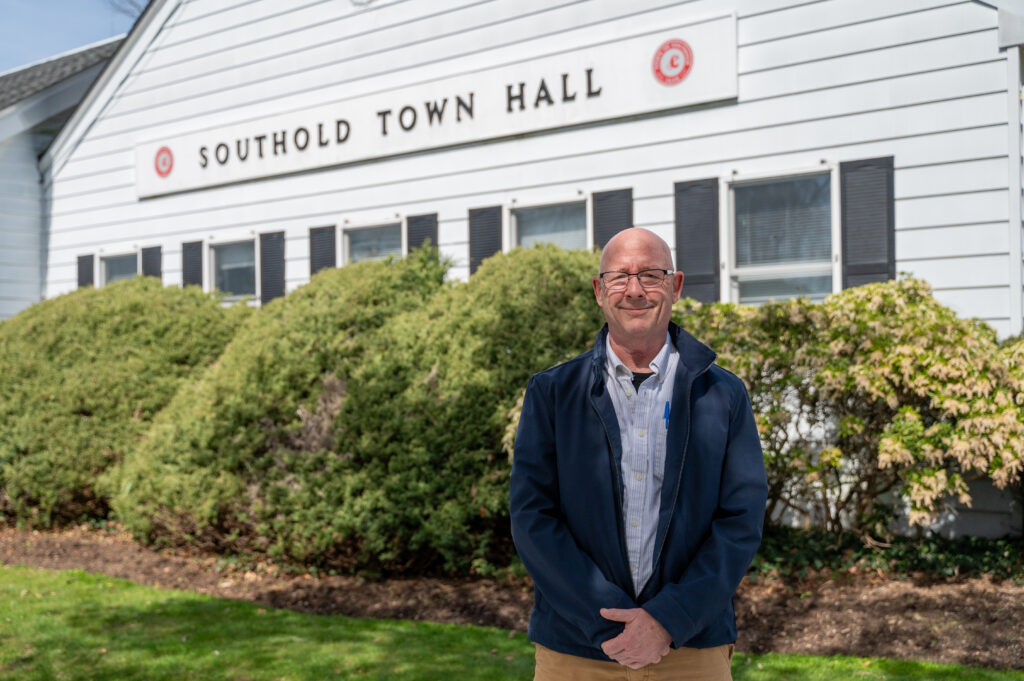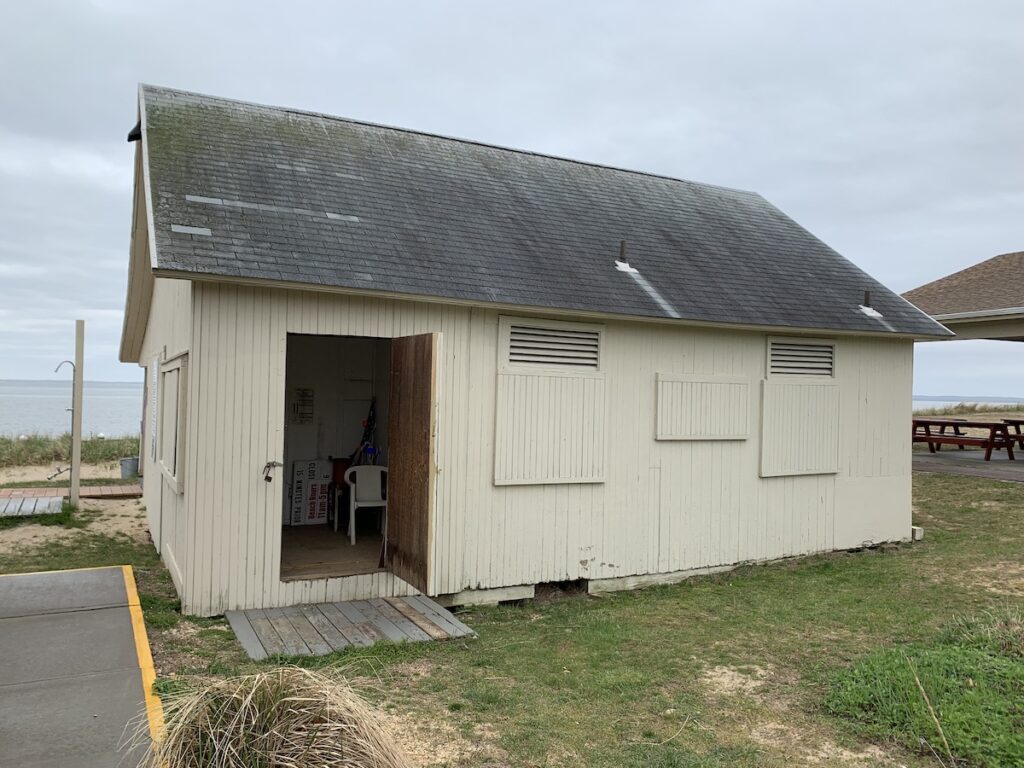Family photograph beckons ‘What might have been’

The photograph on the wall in a Front Street office in Greenport is so striking it seems to cancel out everything around it. It has a haunted quality to it, almost demanding to be looked at.
Amid artwork and objects unique to the village that decorate the walls — such as an old sign for a long-gone hotel, The Greenport House — the photograph shows two men. One is seated on the bench in front of a grand piano, a cigarette in his right hand, his face a beaming smile. The other is standing over him, smiling and laughing as if he’s just told a joke.
The photograph shows an affection between the two men of the kind that comes with respect among equals. The man standing is Leonard Bernstein. The man seated on the bench is William Kapell. The accolades for Mr. Bernstein, who died in 1990 at the age of 72, fill books and movie screens. He was a giant of 20th-century classical music; a list of his accomplishments would take up all the pages of this newspaper. He is the subject of the movie “Maestro,” nominated for seven Academy Awards.
Mr. Kapell died in a plane crash as the aircraft approached the San Francisco airport on Oct. 29, 1953. He was 31 years old. There’s a more emotional way to say that: he was just 31. There’s another number that’s hard to get your mind around: He had spent several months on a piano tour of Australia and was on his way home. He had traveled 7,417 miles across the Pacific Ocean — and crashed just seven miles from the airport.
Since exploding on the classical music scene at age 19, Mr. Kapell at the time of his death was already an internationally famous pianist, said by many to be the greatest of his day. As the cliché goes, he had his whole life ahead of him at the time of his death.
Mr. Kapell’s two children — his son, David Kapell, the former mayor of Greenport, and his daughter, Rebecca Leigh — often contemplate the “what might have been” had their father lived a longer life. The passage of time has not altered their view that their father had an extraordinary career as a classical pianist ahead of him. It was all waiting for him.
“Maestro” tells the story of Mr. Bernstein’s personal life more than about his extraordinary musical accomplishments. Watching the movie reminds both the son and the daughter of their father’s place in the classical music world and all that was lost when he died.
“The two men knew each other very well,” said David Kapell. “My father was internationally famous. He sold a million copies of a classical album. He played concerts in Australia, South America, Israel, many of which were solo recitals. He was a master technician. He and Bernstein were very much equals.
“Even after all these years, younger musicians and pianists still revere him,” he added. “His name comes up all the time.”
“My father and Bernstein came up together,” Ms. Leigh said. “They became very good friends. You can see the affection in that photograph. They probably met at the Juilliard School in New York, where they were students. My father was supposed to teach there when he came back from Australia.”
And she agrees with her brother: “We’ve always known the two of them were equals.”
The photograph is a black and white window into their place in the music world the year it was taken, 1946. The photograph is a time capsule. Mr. Bernstein and Mr. Kapell were rehearsing on the stage of a concert hall in the Bronx as they prepared for a performance of the music of Sergei Rachmaninoff by the New York Philharmonic. Mr. Bernstein was the conductor, Mr. Kapell the solo pianist.
The photographer, Ruth Orkin, took a series of rehearsal photographs. She snapped that picture as Mr. Kapell sat down to practice. Something Mr. Bernstein said cracked them both up. Both of Mr. Kapell’s children have copies of Ms. Orkin’s work at this rehearsal.
“I have that one in my stairwell,” Ms. Leigh said. “When someone comes to the house and sees it, they always say, ‘Is that Leonard Bernstein?’ ”
In 1950, four years after that picture was taken, another gifted pianist, Jerome Lowenthal, began taking lessons from Mr. Kapell. “He was nine or so years older than I,” Mr. Lowenthal said in an interview. He is 92 and still teaches music at The Juilliard School.
“He was very famous then,” he said. “I played for him and he agreed to be my teacher. He was amazing. He was not a conventional teacher, but he was wonderful. He played for me a great deal, sometimes for hours at his home on the Upper East Side.”
Mr. Lowenthal remembers that day in 1953 when he learned about the plane crash. “My mother called to tell me,” he recalled. “It was a great shock. She had heard it on the radio. Truly, I worshiped him. He had a strong personality. He was not always easy, but always generous and sweet.
“By any standards, he was a great pianist,” he said. “I still listen to his recordings. My students listen to them. They are very moving, so technically proficient.”
Finishing the interview, Mr. Lowenthal excused himself. “I have students waiting for me,” he said. “You caught me on my lunch break.”
David Kapell was 4 years old when his father died. Ms. Leigh was 2 and a half. Both share a common memory: Their mother, Anna Lou Kapell wrapping herself in a window curtain to weep in private.
Ms. Leigh also has a foggy memory of the day of the funeral in New York City. “We didn’t go to the funeral,” she said. “We were too young.” Asked if Mr. Bernstein would have attended, she said, “It was a rushed event, with the burial coming two days after the death. If he was in New York City, he would have been there along with the other giants of classical music.”
A 2012 New York Times obituary of Anna Lou Dehavenon — she later remarried — hails her career as an urban anthropologist who documented the lives of women living in a Bronx homeless shelter in the 1980s.
The women’s average age was 26 — the same age she was when her own life was turned upside down. “It was Oct. 29, 1953, the day her husband, William Kapell, one of his generation’s most brilliant pianists, died in a plane crash at the age of 31,” the obituary reads. “He was returning to the United States from a tour of Australia when the plane struck King’s Mountain south of San Francisco, killing all 19 aboard.”
“My mother spent the rest of her life with an open wound,” David Kapell said. “It never healed.”
Ms. Leigh said she has gone through different phases in recent years in which she plays her father’s music a lot, other times less. “I know his music inside out,” she said. “I can hear his style and musical technique in other great pianists today.
“I was in France in the summer of 1992,” she recalled. “I was driving my husband back to the airport in Paris. It was an August day when everyone was leaving for vacation. The traffic was unbelievable.
“I was listening to the radio. And my father playing Rachmaninoff came on. I was just so moved. I almost cried.”








